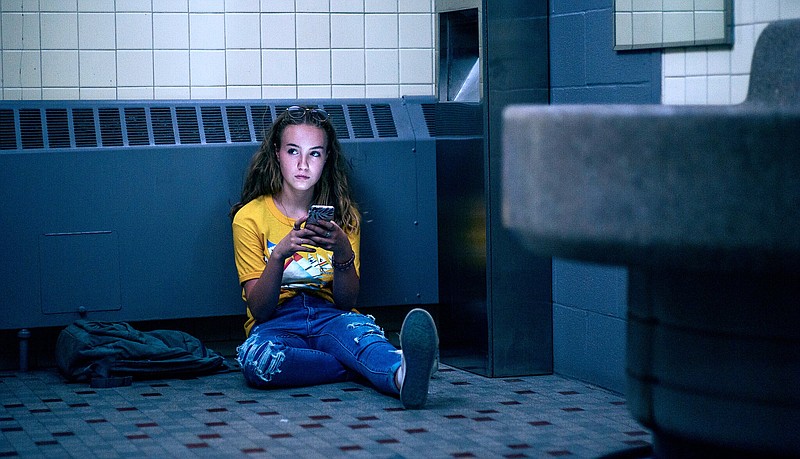At first, Jeanne Leblanc's "Les Notres" appears concerned with adult business: Jean-Marc Ricard (Paul Doucet), a middle-aged mayor of a small town in the Quebec province, addresses a banquet fundraiser by first evoking the tragic factory explosion from a few years before that claimed the lives of several residents, including his own good friend and neighbor. It then shifts to the concerns of teenagers, however, including Magalie (Emilie Bierre), the 13-year-old daughter of the deceased friend in question, in attendance with the remaining members of her family, before we realize the film is actually a heinous combination of both.
Magalie is pregnant, it turns out, to her mother's horror, and refuses to divulge the identity of the father. Not to her friends, who know only of the existence of the elusive boyfriend she calls "Taz"; not to the kindly social worker (Guillaume Cyr) assigned to her by the hospital when her pregnancy is discovered; not to Manuel (Leon Diconca Pelletier), the sweet-faced Mexican foster teen living with Jean-Marc and his wife, Chantal (Judith Baribeau), across the street, who has a huge, innocent crush on her; and certainly not to her mother, Isabelle (Marianne Farley), who alternates between empathy and fury at a dizzying pace.
Before too long, we are soon given to find out the identity of Taz -- the despicable Jean-Marc; whose home office window faces Magalie's bedroom -- and the resulting back and forth between them is ours alone to endure. The girl keeps the secret of her baby's parentage, even as her mother turns bitter and angry at her, peers at school scorn and taunts her for being a "slut" and, as evidenced in one extraordinary camera shot of Magalie walking through the school hallways without anyone else in sight, she is crushingly alone in her suffering.
Certainly, she doesn't get any respite from the repellent mayor, who, rather than coming forward and taking the blame, instead induces her to lie about his own foster son, sending poor Manuel and his younger brother back to Child Protective Services, rather than own up to his deplorable actions. To recap: Jean-Marc, a portly bureaucrat well into his 40s, has repeatedly bedded down the 13-year-old daughter of his late good friend, getting her pregnant in the process, before convincing her to put the blame on his foster son to avoid punishment.
In short, he's a monster, if a largely unexamined one (keep in mind, Magalie was likely a year younger when this affair began, a single year removed from losing her father to the accident), a trend that Leblanc's film falls into far too frequently. Too many of the adult characters are unrealized -- none more so than the suffering Isabelle, who seems emotionally rootless, reacting to her daughter's many moods with a predictable blend of entreatment and outrage, but without any sense of her own feelings -- and the film's ending, while anything but wrapped up neatly, is enigmatic enough to feel unrealized itself.
What's more, and most frustratingly, the film seems to treat Jean-Marc in more or less equal terms as everyone else, assuming his own opinions toward his actions, which he sees as regrettable but hardly the cause for serious alarm. In certain ways, the film shares narrative DNA with Eliza Hittman's fantastic "Never Sometimes Rarely Always," another film about a teenage girl left to her own devices with a pregnancy, but a good deal of that film's power came from focusing entirely on its teen protagonists, and not the adults who set her troubles in motion.
Here, the film's seeming obliviousness to Jean-Marc's unspeakable crimes does add to its protagonist's sense of isolation and discord -- another nifty visual element: Leblanc's camera adding in Magalie's POV shots looking down the road when she's in a car, as if everything is coming at her from off in the distance -- but makes for an uneven emotional journey. If, by the end, the adults have more or less resolved themselves to their new situation, it leaves their teen offspring scattered in their wake, rootless and detached, like leaves stripped off a tree and left pirouetting in the wind.
More News
‘Les Notres’
86 Cast: Emilie Bierre, Marianne Farley, Paul Doucet, Judith Baribeau
Director: Jeanne Leblanc
Rating: Not rated
Running time: 1 hour, 43 minutes
In French with English subtitles
Available for streaming through virtual cinemas.
